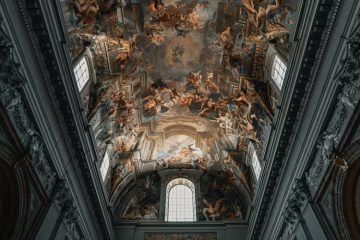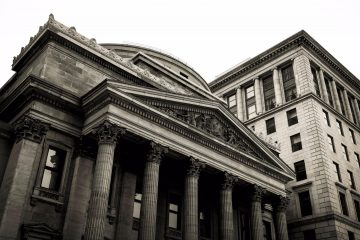By Walker Haynes
There are many passages about creation in the Bible, but I would like to focus on perhaps an unexpected one: John 9. I encourage the reader to review the passage himself, but in summary, Jesus heals a man blind from birth by spitting in the dirt and creating mud, putting the mud on the man’s eyes, and commanding the man to wash himself in the pool of Siloam. After washing himself and thus being healed, others ask if he truly is the same man who was a blind beggar before, to which the man responds “I am.” The Pharisees then interrogate the man’s family, and then the man himself, as to how he was healed and discover what happens. The man then finds Jesus and, after learning that Jesus is the Son of Man, worships Him. On the surface, the passage might have little to do with creation, much less the human inspiration for it. However, a deeper dive reveals much about us and how we are to create in light of being created
To begin, notice the rather unusual method that Jesus uses to heal the man. Does the man whose voice the wind and waves obey need to use the means of dirt and water to heal? Certainly not. Rather, Jesus chooses to use these instruments to make a point. He begins by an act of creation: He spits in the dirt to create mud. While this may seem trivial, it would not have been in the context of first century Judea. The making of mud or clay was specifically prohibited on Sabbaths by the law of the Pharisees. Later in the passage (see verse 16), the Pharisees are enraged with Jesus for working on the Sabbath. There are important takeaways regarding this aspect of the miracle, but those are outside the purview of this short piece. What I want to highlight is that Jesus is framing the healing as a creative act. This is further emphasized by the exact tools that He uses. His making of mud from dirt and spit mimics the initial creation of man from Genesis 2 where God breathes life into dust to create Adam.
The next step that Jesus uses is commanding the man to wash in the pool of Siloam. This is also an act of creation, but one that uses the agency of man. Continuing with the parallel of Genesis, the washing in the pool of Siloam mirrors God’s restart of creation: the great flood. Just as God delivered Noah through the waters of the flood by having Noah build the ark, Jesus here heals the blind man through the waters of the pool having him wash himself. The Apostle Peter in his first epistle connects Noah’s deliverance to the sacrament of baptism, which we also see mirrored in the blind man’s washing. However, while all three events are accomplished through human means, we must remember that God is the principal actor in them all. Noah’s ark does save him and the animals, but the waters rise and recede only through the power of God. It was certainly not the mere washing that healed the blind man, but the power of God acting through the washing. As Peter says, we find salvation in baptism not through the human washing and removal of dirt from the body, but through God’s divine act of regeneration (there are varying views in the Christian tradition as to how the sign and thing signified are precisely related). This is important because we see not only God’s initial creative act imaged in the healing, but also God’s second act of new creation. This means that we, as believers baptized by the Holy Spirit, are a new creation ourselves. As Paul puts it in his second letter to the Corinthians, “Therefore, if anyone is in Christ, he is a new creation.”
God’s act of second creation that He works in us has implications for our nature as creative beings. We see this in how the rest of the story plays out. As the now healed man returns from the pool, the people around him are astounded that the man blind from birth can now see. Many are so astonished that they conclude that this is a different man. As we saw above, they are not entirely wrong. The man is the same person but, in a sense, also a new creation. The new man reveals his new nature in how he responds when people speculate as to his identity. Most English translations translate the formerly blind man’s response as “I am the man” or “I am he,” but the original Greek simply reads Ego eimi (Ἐγώ εἰμι.) which is most literally rendered as simply “I am.” Not only is “I Am” the way that God introduces himself to Moses in Exodus, but it is also a term that Jesus often uses to identify Himself as divine in the Gospel of John (see John 8:58). The man’s response here implies that he is united to Christ by asserting that he is the same person he used to be while associating himself with a title belonging to Jesus. This is true for all believers. As Paul writes in his letter to the Galatians, “It is no longer I who live, but Christ who lives in me.” If we are to be identified as Christ, we must live in a way that shows it. That is why Paul charges the church in Ephesus in his letter to them “Therefore be imitators of God.” We as believers are also to seek unity with Christ and thus imitation of Him.
If we are to imitate our creator, we must create ourselves. While it is not in our power to create in the way that God does (we cannot create life out of the dead physically or spiritually), we are called to create in other ways. There are two ways that the formerly blind man participates in creative acts in the passage. First, he is creative in his witness. After being healed, the formerly blind man spread the word of Jesus throughout the city, so much so that the Pharisees are forced to confront him and his parents. While only God can change hearts, he often chooses earthly means as his way of doing so. Just as Jesus works through mud and water to heal the blind man, the Holy Spirit uses the church as a witness to bring more people to Himself. Thus, we participate in God’s act of creation when we witness to others, and they receive new births. Second, the man eventually returns to Jesus to thank Him and eventually worships Him. Our worship of God is also a creative act. So many great hymns have been written, works of art been painted, and magnificent churches designed to worship our creator. We reflect, however imperfectly, the gift of creation He gave us to.


0 Comments